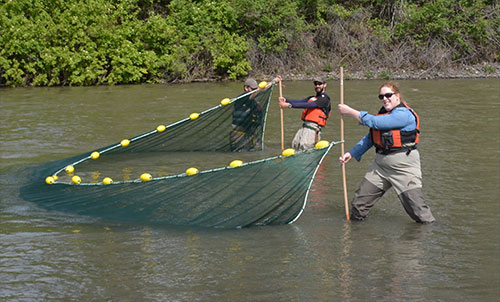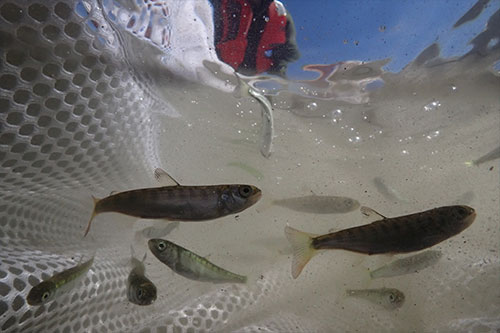Study lead author Sam Wilson, along with collaborators, sampling juvenile salmon in the Skeena River. The Skeena River rises in the Skeena Mountains in the northern part of the BC province and flows generally southwestward, receiving its two major tributaries, the Babine and Bulkley rivers, before emptying into Chatham Sound (an arm of the Pacific Ocean), south of Prince Rupert, after a course of about 360 miles. |
Many salmon species have migration timing that has substantially changed over the last 20 or more years. Pink and chum salmon had the fastest rates of change (migrating seven days per decade earlier), while other species’ migration timing has not been changing, on average.
However, a deeper dive into the data showed that there was greater variation between populations within species than between different salmon species. These population-specific changes were unpredictable with currently available climate and geographic data.
“We were really surprised. Yes, there were really strong signals of climate change as many salmon tended to be migrating earlier, but it was incredibly variable and unpredictable.” Wilson says.
In response to the same level of warming, the study showed that some populations had earlier migration timing, while others had no change, or even migrated later in the year.
When the timing of juvenile salmon migrations and food availability matches, this creates ideal conditions for surviving those first few months in the ocean and can directly influence how many adults return.
The researchers are concerned that salmon do not appear to be responding to changes in the coastal ocean, which could make mismatches more common under future climate change.
A school of juvenile salmon that have been intercepted during their migration. They will be counted, measured, and released. The Skeena River is the second-longest river entirely within British Columbia, Canada (after the Fraser River). Since ancient times, the Skeena has been an important transportation artery, particularly for the Tsimshian and the Gitxsan - whose names mean "inside the Skeena River", and "people of the Skeena River," respectively. The Tsimshian migrated to the Lower Skeena River, and the Gitxsan occupy territory of the Upper Skeena. Other tribes live elsewhere in BC, and descendants of one group live in Metlakatla, Alaska. |
Matthew Sloat, co-author of the review and director of science at the Wild Salmon Centre, notes that one important accomplishment of the study was to bring scientists and datasets together.
“This study brought together more than 50 scientists from government and community organizations, with everyone contributing their expertise and data to better understand this important, but often overlooked life stage.”
It also shows the importance of long-term datasets, he says.
“Long-term monitoring projects are expensive and logistically challenging to run, and yet are increasingly important to better our understanding of how climate change may be effecting salmon.”
As climate change continues to alter ecosystems, being able to predict what species or populations might be the most vulnerable can help to prioritise conservation. Study co-author Jonathan Moore notes that when those changes are difficult to predict, a precautionary management approach is important for the long-term conservation of ecologically, culturally, and economically important species, such as Pacific salmon.
“Climate change is here and it is changing salmon and their ecosystems,” says Moore, a professor with the Salmon Watersheds Lab in the Faculty of Science at SFU. “Many of these changes are going to be unpredictable, which calls for the protecting of salmon biodiversity and their habitats.”
On the Web:
Nature Ecology & Evolution: Phenological shifts and mismatch with marine productivity vary among Pacific salmon species and populations
This article is provided by Simon Fraser University. Simon Fraser University (SFU) is a public research university in British Columbia, Canada, with three campuses, all in Greater Vancouver: Burnaby (main campus), Surrey, and Vancouver. Simon Fraser University's News is written and provided by SFU's Faculty of Science. |
Representations of fact and opinions in comments posted are solely those of the individual posters and do not represent the opinions of Sitnews.
Send a letter to the editor@sitnews.us
SitNews ©2023
Stories In The News
Ketchikan, Alaska
Articles & photographs that appear in SitNews are considered protected by copyright and may not be reprinted without written permission from and payment of any required fees to the proper freelance writers and subscription services.
E-mail your news & photos to editor@sitnews.us
Photographers choosing to submit photographs for publication to SitNews are in doing so granting their permission for publication and for archiving. SitNews does not sell photographs. All requests for purchasing a photograph will be emailed to the photographer.


